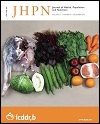Milk and Protein Intake by Pregnant Women Affects Growth of Foetus
DOI:
https://doi.org/10.3329/jhpn.v31i4.19991Keywords:
Anthropometric measurements, Foetal growth pattern, Growth velocity of foetus, Maternal daily protein intake, Maternal milk intake, IndiaAbstract
The study assessed the effects of the daily intake of milk and protein by pregnant women on foetal growth and determined the growth pattern and velocity of growth. A total of 504 ultrasound observations from 156 respondents were collected following a cross-sectional design in the last trimester of pregnancy; majority of them were in the last month of pregnancy. De facto and purposive sampling was done, and direct interviews of affluent pregnant women were conducted. Kruskal-Wallis test shows that majority of the respondents had tendency to consume 155.65 to 465.17 mL of milk per day, resulting in better and higher foetal growth. Most respondents consumed about 50-70 g of protein per day, and the foetal growth measurements, such as abdomen-circumference, femur length, biparietal diameter, and head-circumference, on an average, were higher in the same group. Quadratic regression model exhibited that all the traits of growth pattern in Model 1 (low milk and protein intake) appeared to have more mode of decline, in contrast to Model 2 (more milk and protein intake), which shows better growth. In addition, velocity of growth pattern was obtained through the first derivative of quadratic regression of growth pattern. Moreover, 95% confidence interval calculated for regression line slope of Model 1 and Model 2 showed that the estimation point (2 B2) of Model 1 does not lay into 95% CI of Model 2; so, statistical significance assorted and also the same trend conversely hold for Model 2. The rate of growth was highly influenced by maternal milk and protein intake. These findings suggest that contribution of common nutrients or other nutritional factors present in milk and protein promote the growth of foetus.
DOI: http://dx.doi.org/10.3329/jhpn.v31i4.19991
J HEALTH POPUL NUTR 2013 Dec; 31(4): 435-445
Downloads
624
515

